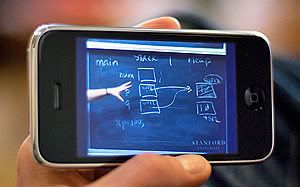 "I was born under unusual circumstances." And so begins 'The Curious Case of Benjamin Button,' adapted from the 1920s story by F. Scott Fitzgerald.In respect of the aforementioned great movie, I feel a funny similarity between the movie with the current situation that befell on Palm and its upcoming smartphone: the Prē™. As we all know it, ever since the Prē™ introduced for the first time at CES 2009, it draws plenty of attentions not only from Palm-fans but also both from tech enthusiasts and competitors.
"I was born under unusual circumstances." And so begins 'The Curious Case of Benjamin Button,' adapted from the 1920s story by F. Scott Fitzgerald.In respect of the aforementioned great movie, I feel a funny similarity between the movie with the current situation that befell on Palm and its upcoming smartphone: the Prē™. As we all know it, ever since the Prē™ introduced for the first time at CES 2009, it draws plenty of attentions not only from Palm-fans but also both from tech enthusiasts and competitors.The Prē™ is yet to be launched and land on the market into our palms, but the newly born child of Palm which is supposedly to save the company to stay afloat in today’s tough competition has the possibility to face a potential law suit from Apple. Where for the last weeks, Apple and Palm have been exchanging nothing but brawl talks through mass media.
Neither of both companies are pointing their fingers at the moment, but it’s easy to guess since this all started when Apple COO Tim Cook was asked about Palm Prē™, and how close some parts of the Palm webOS™ mimics iPhone multi-touch gestures. And when U.S. Patent Office awarded Apple with the iPhone multi-touch patent, the Cupertino-based company now has grounds to start law suits against Palm. It’s only a matter of time until we see an ugly fight between those companies which are both well known for creating break through innovations…
While for us, end users and consumers it’s more interesting to know what is it about iPhone multi-touch patent that Apple plans to protect with whatever arsenals the company has. The curiosity is enough to make these three famous tech sites to published deeper analysts to look into the patent dispute:
- Nilay Patel from Engadget is helped by Mathew Gavronski, a patent attorney in the Chicago office of Michael Best & Friedrich.
- John Mahoney from Gizmodo is helped by R. Polk Wagner, a professor of patents law at the University of Pennsylvania Law School.
- Rob Enderle, a Principal Analyst from Enderle Group wrote for TG Daily
If we are to remember the multi-touch in iPhone, it went way back to the first introduction of iPhone first generation at Macworld 2007 by Steve Jobs himself, where the “patented revolutionary UI (User Interface)” line written all over the slides on big screen. And long before that, Apple has bought a company called FingerWorks back in 2005, who founders Wayne Westerman is also named in the iPhone multi-touch patent along with Steve Jobs.
Apple has prepared iPhone multi-touch technology for quite some time, so it does make sense in a way for the company to defend the IPs (Intellectual Property) which have cost millions of dollars and cooked long till ready in its R&D department.
Patent fights
Apple is not the only one who can think of preparing for legal law suit against Palm, in fact Nilay (Engadget) has dug up four patents from literally hundreds of Palm’s patents that seem to directly implicate the iPhone.
It’s not a simple “pillow-fight” anymore, a fight which no one will receive serious injuries. But if Apple is forcing the iPhone multi-touch patent to the court, Palm might use its own patents to counter back Apple, and so the table could turn into Palm’s favor. Remember, Palm has been in the mobile (PDA and smartphone) market long before Apple was.
Risks assessment
Alright, enough of the long talk about what kind of patent Apple has or Palm has. It’s tiring enough to hear the 358-page of the multi-touch patent, I can’t imagine how boring it is to discuss one page after another. Let’s get to the point: who’s going to win this patent dispute? Apple, or Palm?
I’m going to present to you first the insight view by Rob (TG Daily) about how dangerous it is for Apple if its thick patent fail in court: ”… smaller patents can be defended individually and losing a small number of them would not necessarily put the entire phone at risk. But if any major part of this patent fails it could effectively take the entire patent out…”
That’s true, the biggest risk for losing the patent for Apple is almost equal as losing the iPhone itself. And Nilay (Engadget) said: “…by suing Palm, Apple's putting its iPhone patents at risk, and that's an awful big ante. Same for Palm if it sues Apple and loses -- it stands the risk of losing its patents…”
Yes of course, Apple has a solid & firm grounds for sticking up its iPhone multi-touch technologies covered in the patent. Apple can win the case, if it ever goes to court.
But if I may put a counter argument, or like what Rob (TG Daily) has put it way much better in his own words: “Each item in Apple's patent, once in front of a judge, could have widely different interpretations depending on the judge, which is generally why you try to keep patents as simple as possible.”

No comments:
Post a Comment